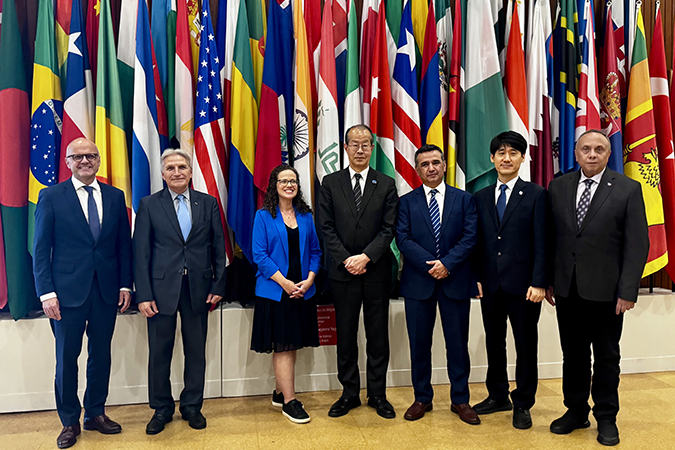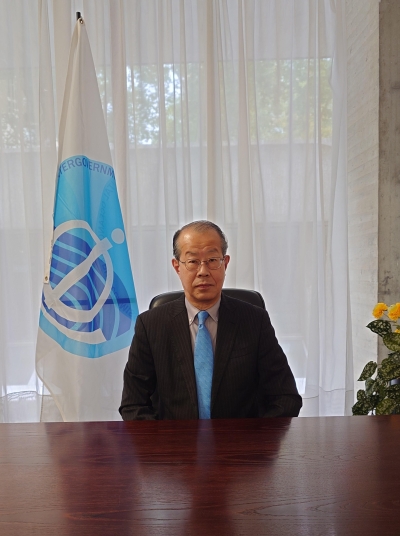Project Professor Yutaka Michida re-elected as IOC/UNESCO Chairperson

The election of Officers of the Intergovernmental Oceanographic Commission (IOC) took place at the 33rd Session of the IOC/UNESCO Assembly at the UNESCO headquarters in Paris from June 25 to July 3, 2025. Project Professor Yutaka Michida from the Atmosphere and Ocean Research Institute and the Special Presidential Envoy for the U.N. Ocean Decade, The University of Tokyo, was re-elected as the Chairperson for the next term of office.
The IOC was established in 1960 as an organization with functional autonomy within UNESCO, and is the only organization in the United Nations that carries out intergovernmental cooperation, planning, and coordination of research, observation, data exchange, and programs to support developing states relating to the world’s oceans. There are currently 152 member states.
Project Professor Michida’s term of office will be approximately two years to the end of the next ordinary session of the Assembly to be held in late June 2027.
About the Intergovernmental Oceanographic Commission (IOC) of UNESCO
1.IOC
Year of establishment: 1960
Member States: 152 countries
Executive Council: 40 countries (as of June 2025)
Decision-making bodies: Assembly (held biannually), Executive Council (held annually)
Executive Secretary: Vidar Helgesen (Norway, as of June 2025)
Features: Established to promote scientific investigation that contributes to enhancing knowledge and understanding of the oceans, and to improve management of the oceans, coastal areas, and marine resources through international cooperation. The IOC is a comprehensive intergovernmental commission on marine science operating under the umbrella of UNESCO. The IOC has been granted certain autonomous mandates as the only United Nations organization conducting ocean science investigations and research activities.
Main projects: Promoting ocean observation and research, promoting regional cooperation, promoting construction of the Global Ocean Observing System (GOOS), operating an international ocean data and information exchange system, constructing tsunami early warning systems, promoting education, training, capacity development, and technology transfer, etc. The IOC also formulated the action plan The United Nations Decade of Ocean Science for Sustainable Development (2021-2030) ("the Ocean Decade"), and is leading the implementation of this plan.
2.IOC officers
Chairperson: One person is elected from the member states.
Vice-chairpersons: One person is elected from each of the five regional groups*.
The term of IOC officers is approximately two years, and they can serve for a maximum of two consecutive terms.
*Regional groups: Group I: Europe and North America; Group II: Russia and Eastern Europe; Group III: Latin America and the Caribbean; Group IV: Asia and the Pacific; and Group V: Africa and Arab States. Japan belongs to Group IV.
3. Relationship between the IOC and Japan
Japan has been on the Executive Council since the establishment of the IOC. The term of office of the Executive Council is two years. The Executive Council is chosen through elections held by the Assembly.
As a maritime nation, Japan contributes personnel and provides financial support through trust funds, especially in the fields of ocean observation, data exchange, tsunami early warning systems, human resource development, and regional activities.
The IOC Working Group was established under the Scientific Sub-Commission of the Japanese National Commission for UNESCO. (Chief Examiner: Professor Hiroaki Saito at the Atmosphere and Ocean Research Institute, The University of Tokyo)
Related Organizations: Ministry of Education, Culture, Sports, Science and Technology; Cabinet Office Marine Affairs Bureau; Ministry of Foreign Affairs; Ministry of Agriculture, Forestry and Fisheries (Fisheries Agency); Ministry of Land, Infrastructure, Transport and Tourism (Japan Meteorological Agency, Japan Coast Guard); Ministry of the Environment; Japan Agency for Marine-Earth Science and Technology (JAMSTEC); and the Atmosphere and Ocean Research Institute, The University of Tokyo
Yutaka Michida’s background
Academic background:
| (1981) | Graduated from the Department of Earth Science, The University of Tokyo |
| (1983) | Completed a Master’s Degree at The University of Tokyo Graduate School of Science |
| (1999) | Obtained a Doctorate (Science) from The University of Tokyo |
Career:
| (1984) | Hydrographic Department, Japan Coast Guard (now known as the Hydrographic and Oceanographic Department) |
| (1986 to 1987) | Member of the 28th Japanese Antarctic Research Expedition |
| (1989) | Concurrent appointment at the Science and Technology Agency (until 1991) |
| (1999) | Assistant Counselor for Planning Division, Hydrographic Department, Japan Coast Guard |
| (2000) | Assistant Professor at The University of Tokyo, Ocean Research Institute |
| (2007) | Professor at The University of Tokyo, Ocean Research Institute |
| (2010) | Professor at The University of Tokyo, Atmosphere and Ocean Research Institute |
| (2015) | Deputy Director of The University of Tokyo, Atmosphere and Ocean Research Institute (until 2019) |
| (2001) | Investigation Commissioner, Natural Science Sub-Commission of the Japanese National Commission for UNESCO |
| (2018) / | Chief Examiner for the Sub-Commission of Intergovernmental Oceanographic Commission, Natural Science Sub-Commission of the Japanese National Commission for UNESCO (until 2023) |
| (2021) | Committee Member of the Japanese National Commission for UNESCO |
| (2024) | Retired from the University of Tokyo |
| (2024): | Special Presidential Envoy for the U.N. Ocean Decade, The University of Tokyo/Project Professor at the Atmosphere and Ocean Research Institute |
| (2024): | Specially Appointed Counselor at the Japan Agency for Marine-Earth Science and Technology |
Awards:
| (2015) | 8th National Maritime Award (Japan Prime Minister’s Prize) |
| (2016) | Certificate of Appreciation from the Director General of the Japan Coast Guard |
| (2019) | Intergovernmental Oceanographic Commission of UNESCO IODE Award |
| (2023) | Techno-Ocean Awar |
Experience within the IOC:
| (2011 to 2015) | IOC Vice-chairperson |
| (2019), (2021) and (2023) | Chairperson of the Resolution Committee at the 30th, 31st and 32nd IOC Assembly |
| (2018) and (2022) | Chairperson of the Resolution Committee at the 51st and 55th Session of the Executive Council of IOC |
| (2023) | Chairperson of IOC |







